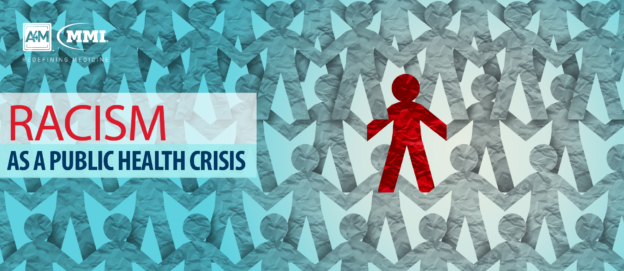Current events have sparked nationwide controversy, forcing organizations within all industries to look inward, reexamine their practices, and reassess their commitments to achieving and maintaining racial equality. The past few months in particular have exposed the racial health inequities disproportionately affecting African American communities as the COVID-19 pandemic has hit minority populations the hardest.
Following weeks of protests against police brutality and structural racism sparked by the killings of George Floyd, Ahmaud Arbery, and Breonna Taylor, many other healthcare groups have utilized their platforms to share outrage, condemn the injustices at hand, and promote an attitude of activism within the industry as a method of combating the impact of systemic racism on public health.
Racial Disparities in Population Health
As evidenced by recent events and the disproportionate impact of the COVID-19 pandemic on African American and marginalized communities, racism is a public health crisis. In the United States, the health of African Americans consistently lags behind most other racial groups as black men and women face increased risks of chronic illness, infection, and injuries compared with their white counterparts. Overall, the average lifespan for African Americans is approximately 6 years less of that for whites.
While financial instability is believed to be the leading cause fueling disparities in the industry, the correlation between socioeconomic status – the strongest predictor of health outcomes – and health is primarily dependent upon race. Per data reported by MedPage Today, mortality rates for babies born to African American women with master’s or doctorate degrees are significantly higher than those for babies born to white mothers who have less than an eighth-grade education. These statistics disprove prior beliefs that education levels contribute to poorer health outcomes among this demographic. At the same time, while black women face a far lower risk of developing breast cancer risk, they are 40% more likely to die from it.
In addition, cardiovascular disease mortality rates are 22% higher in African American women than in white women, while cervical cancer mortality rates are up to 71% higher. Shockingly, African American women are 243% more likely to die from pregnancy or childbirth-related causes than their white counterparts.
Overall, African Americans have poorer health outcomes than whites across nearly every category of illness – even after controlling for external factors. This is largely a result of disparities in healthcare accessibility and systemic racism; there is a growing body of evidence that shows it is the chronicity rather than the severity of exposure to unfair treatment that most strongly correlates with higher morbidity or mortality rates among this group. Repetitive discriminatory encounters take a significant toll on the health of members of discriminated communities, as evidenced by their substandard health outcomes.
Healthcare Organizations Respond
Recent events and their ramifications express the deep-seated anger and frustration of marginalized populations experiencing inequity at every turn in need of systemic change. As evidenced by persisting disparities in health outcomes between racial groups, the healthcare industry plays a significant role in the systemic racism at hand. Healthcare organizations across the nation are uniting to deliver statements of promise and instate guidelines that aim to promote activism, support marginalized racial groups, and ultimately achieve equality.
“As places of healing, hospitals have an important role to play in the wellbeing of their communities. As we’ve seen in the pandemic, communities of color have been disproportionately affected, both in infection rates and economic impact,” Rick Pollack, president and CEO of the American Hospital Association
(AHA) told Fierce Healthcare. “The AHA’s vision is of a society of healthy communities, where all individuals reach their highest potential for health … to achieve that vision, we must address racial, ethnic and cultural inequities, including those in health care, that are everyday realities for far too many individuals. While progress has been made, we have so much more work to do.”
The Society for Healthcare Epidemiology of America (SHEA) also denounced inequalities in public health as related to both police brutality and the disparate effects of COVID-19 on racial minorities. Executives from the Association of American Medical Colleges (AAMC) called on other health groups to utilize their platforms for advocate for change.
“Over the past three months, the coronavirus pandemic has laid bare the racial health inequities harming our black communities, exposing the structures, systems, and policies that create social and economic conditions that lead to health disparities, poor health outcomes, and lower life expectancy,” David Skorton, MD, president and CEO of AAMC, and David Acosta, MD, AAMC chief diversity and inclusion officer, said in a statement.
As a country, the United States is currently facing a dual public health crisis –the coronavirus outbreak and structural racism – both claiming countless lives and exposing the dysfunctional nature of national systems. As an initial step, health system leaders are being called on to educate themselves, partner with local agencies, and implement anti-racist training to begin to dismantle structural racism.
In a statement released Harvard Chan School of Public Health, dean Michelle A. Williams underscores the shared responsibility underlying striving for change: “To understand how this manifests today, one need only examine the disparities in health care, pollution exposure, and access to green spaces, nutritious food, and educational opportunities that have long harmed health—and prematurely ended lives—in marginalized communities. While the COVID-19 pandemic has newly laid these inequities bare for all Americans to see, the underlying injustices have endured for generations. And all of us have a responsibility to acknowledge and address them.”
Before widespread change can occur within the industry, the prevalent disparities in health outcomes and healthcare accessibility across racial populations must be acknowledged. In order to initiate healthcare system reform, organizations and their leaders must advocate for and exemplify an equitable approach to medicine. Reducing current disparities will require large-scale, transformative improvement not just of the system itself, but of society at large.

